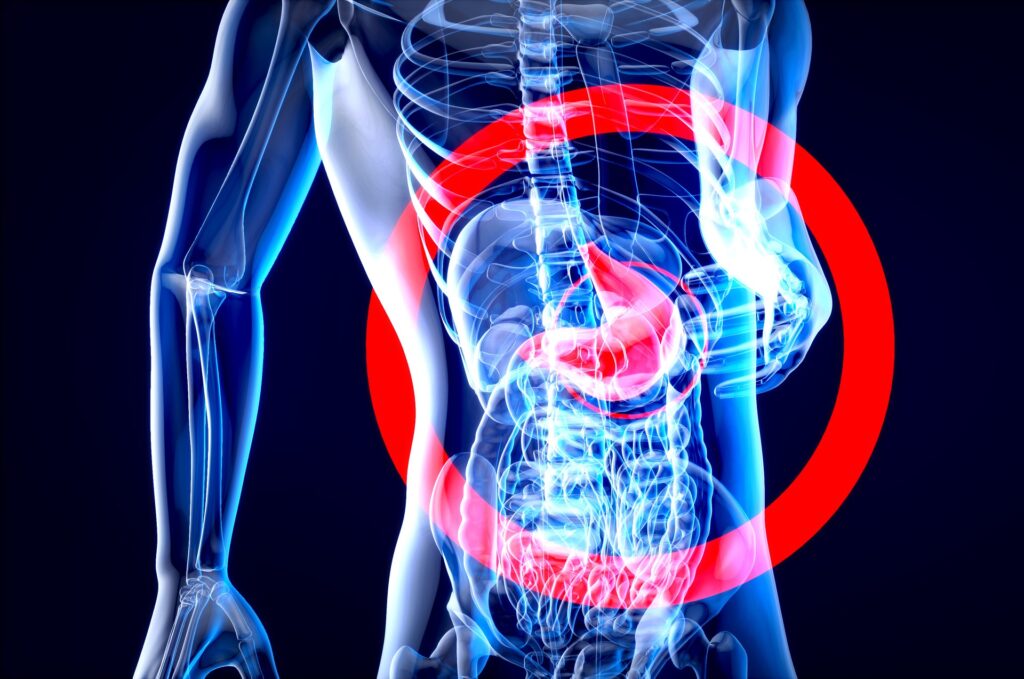The gastrointestinal and digestive system are important to the health of our overall wellness. It works by breaking down food, absorbing nutrients, and distributing them to every cell in our body. It is responsible for our energy and repair of our cells. It plays a vital role in maintaining a natural balance and function of our body, as well as efficiently eliminating waste.
 Unfortunately, our digestive system can experience an affliction or imbalance that leads it to function improperly. This can lead to digestive issues, life altering symptoms, and diseases.
Unfortunately, our digestive system can experience an affliction or imbalance that leads it to function improperly. This can lead to digestive issues, life altering symptoms, and diseases.
There are over 20 million people in the United States that suffer with chronic digestive issue or disease. This number is rising continuously every year.
The key to identifying a digestive problem is understanding how the system works.
The digestive system encompasses eight principle components, including the anus, rectum, large intestine, small intestine, stomach, esophagus, throat, and mouth.
It also includes the pancreas, gallbladder, liver, and salivary glands, which produce enzymes and digestive juices that aid in the digestion process.
Most common digestive disorders
Celia Disease
Celiac disease is a digestive disorder that affects the immune system. It is triggered by food that contains gluten. The protein found in rye, barley, and wheat. Causing problems in the small intestine that can lead to nutrient deficiencies and digestive problems.
Symptoms include:
Constipation
Vomiting and nausea
Abdominal pain
Gas and bloating
Weight loss
Fatigue
Diarrhea
Unfortunately, there is no cure for Celiac Disease, but there are steps that can promote intestinal healing.
Irritable Bowel Syndrome (IBS)
IBS affects the large intestine and is a common disorder. While studies are taking place to better understand, symptoms can be managed with lifestyle and diet changes. Prescription medication can also help treat symptoms, which include:
Symptoms include:
Inconsistent bowel movement
Abdominal cramping and pain
Gas and bloating
Constipation
Diarrhea
Changes in bowels appearance
Ulcerative Colitis
As a chronic inflammatory bowel disease, ulcerative colitis is a disease where the immune system reacts abnormally. Causing painful ulcers and chronic inflammation on the inner lining of the intestine.
The symptoms can vary greatly depending on the inflammation:
Abdominal cramping and pain
Rectal bleeding or pain
Urgency or inability to defecate
Fatigue or weight loss
Crohn’s disease
Crohn’s disease is an inflammatory bowel disease that also causes inflammation in various sections of the digestive system. Since it typically affects deeper layers of the bowel, it can cause debilitating and extremely painful symptoms. Treatment from a gastrointestinal doctor can help treat symptoms.
Symptoms Include:
Abdominal cramping and pain
Fatigue, fever, diarrhea
Blood in the stool
Inflammation of the joints, eyes, and skin
Inflammation of the bile ducts or liver
Anemia or kidney stones
Gastrointestinal reflux disease (GERD)
GERD is a gastroesophageal reflux disease that allows the stomach acid to blow back into the esophagus, irritating the lining in the digestive system. Treatment typically involves diet and lifestyle, and medication.
Symptoms include:
Difficulty swallowing
Heartburn or Chest pain
Chronic coughing
Feeling like there is a lump in your throat
Regurgitation of liquids and food
Disrupted sleep
When to see a Gastrointestinal specialist
If you are having digestive issues, experiencing any of the above symptoms, or have questions about your digestive system, contact Gastroenterology Consultants of Central Florida
